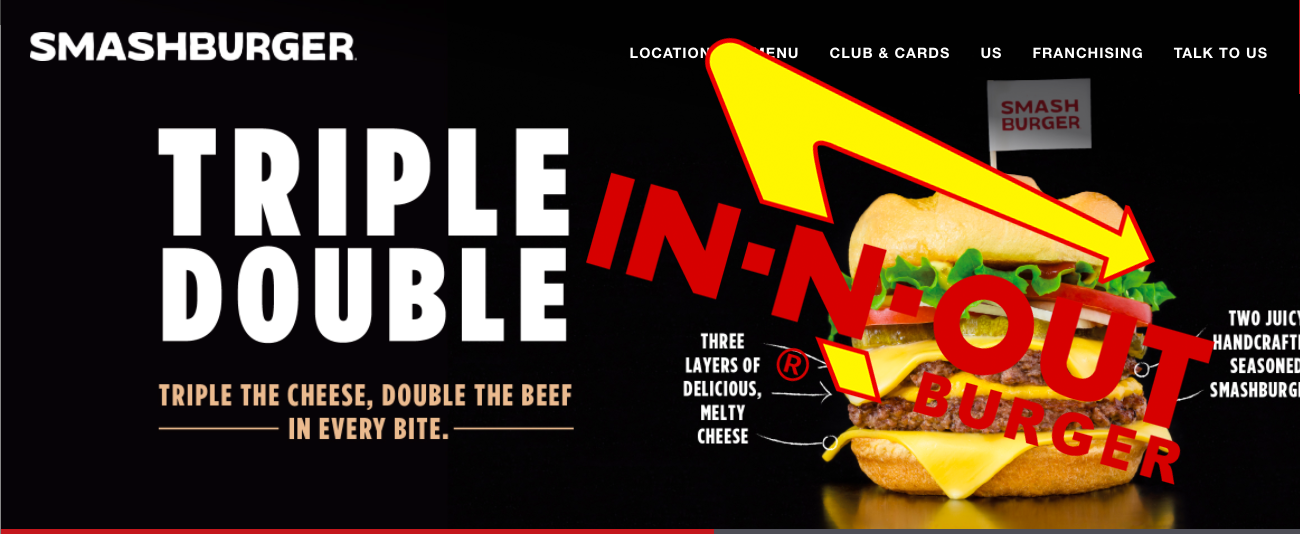
In-N-Out Goes To War With Smashburger Over ‘Triple Double’ Cheeseburgers
Two fast food chains with dedicated fanbases are set to square off in a courtroom over Smashburger’s new Triple Double cheeseburger, which In-N-Out Burger claims is illegally trying to copy its famous Double-Double and Triple-Triple sandwiches.
California-based In-N-Out has been serving up the Double-Double (two beef patties; two slices of cheese) cheeseburger since before many of us were born, and the chain has state and federal trademark registrations on the phrase going back more than four decades. In 1990, the company added trademark registrations for sandwiches on its “not-so-secret” menu, like the Triple-Triple (three patties; three cheese slices) and Quad-Quad (if you haven’t figured this pattern out yet, oh well).
Earlier this summer, Denver-based Smashburger — which operates around 350 locations in 38 states — launched a new Triple Double burger, which is two beef patties with three slices of cheese. Even though In-N-Out does not have a trademark on the “Triple Double” name, the company claims in a new lawsuit that Smashburger is nonetheless deliberately trying to copy In-N-Out’s existing registered marks.
“Smashburger chose to use the TRIPLE DOUBLE and SMASHBURGER TRIPLE DOUBLE marks because Smashburger knew, prior to its use such marks, that each of In-N-Out’s Registered Marks is famous and connotes a high standard of quality,” argues In-N-Out in a complaint [PDF] filed Monday in a federal court in California.
The complaint contends that the similarity between In-N-Out’s existing marks and the Smashburger Triple Double are likely to confuse consumers who might be led to “believe that In-N-Out has approved or licensed Smashburger’s use of its marks, or that In-N-Out is somehow affiliated or connected with Smashburger or its services.”
Smashburger has also applied to register the Triple Double trademark with the U.S. Patent and Trademark Office, and In-N-Out is currently arguing before the Trademark Trial and Appeal Board that these applications should be denied.
In-N-Out filed its opposition to those applications in early June — about a month before Smashburger launched the Triple Double marketing. This, says In-N-Out, is proof that the other chain was well aware of the In-N-Out trademarks in advance of releasing its new burger.
The In-N-Out complaint alleges state and federal claims of trademark infringement and dilution, and unfair competition. The company is seeking an injunction preventing Smashburger from continuing to use the Triple Double name.
Smashburger responded to Consumerist’s request for comment on the lawsuit with a statement from CEO Tom Ryan. However, Ryan’s statement — aside from a contention that the Triple Double is “not comparable to any In-N-Out menu offering” –contained no relevant information and is effectively marketing copy for the Triple Double and its sales figures. If Smashburger chooses to provide a comment that responds more directly to the allegations raised in the complaint, we’ll include it here.
This isn’t In-N-Out’s first legal battle over its trademarks. In 2007, it sued a Utah restaurant called Chadder’s [PDF], alleging that the eatery had copied its look and its menu items off of In-N-Out.
In that case, In-N-Out said in a court filing [PDF] that it learned of Chadder’s through Utah customers who contacted the chain because they believed that this new Chadder’s restaurant was somehow connected to the bigger, older burger chain.
Customers also claimed they could order In-N-Out menu items — like “Animal” fries and a Double Double — at Chadder’s, and employees knew exactly what to make. In-N-Out’s general counsel actually traveled out to Utah to see for himself, and told the court he confirmed these customers’ assertions.
In June 2007, a judge granted a temporary restraining order [PDF] against Chadder’s, barring the restaurant from selling items that may infringe on the In-N-Out trademarks. The case was subsequently settled and dismissed [PDF] in Nov. 2007, and Chadder’s continued to exist — and even expanded to a handful of locations — before apparently going out of business in 2010, perhaps not coincidentally after In-N-Out opened its first restaurants in the area.
Want more consumer news? Visit our parent organization, Consumer Reports, for the latest on scams, recalls, and other consumer issues.

